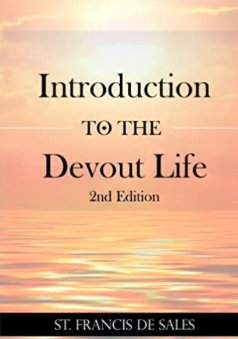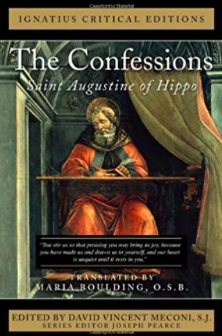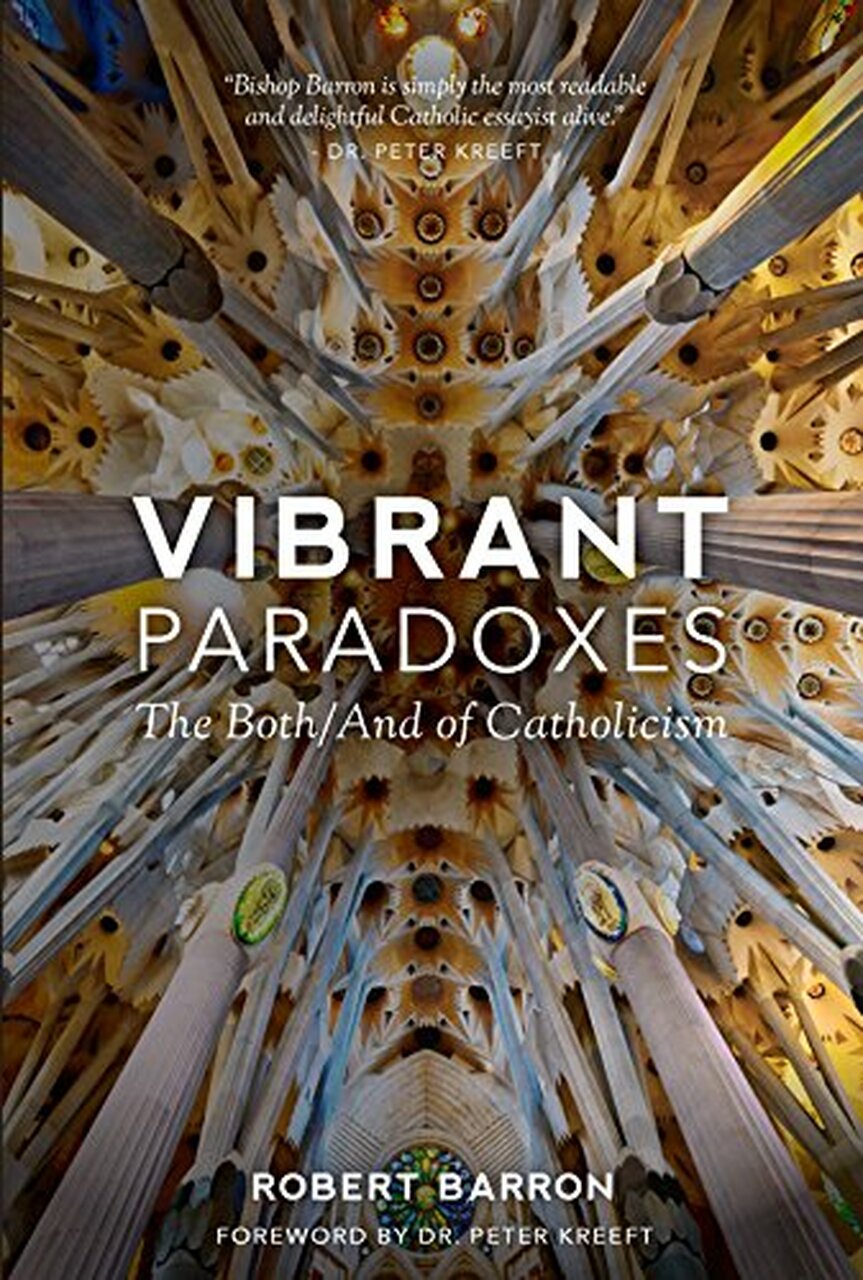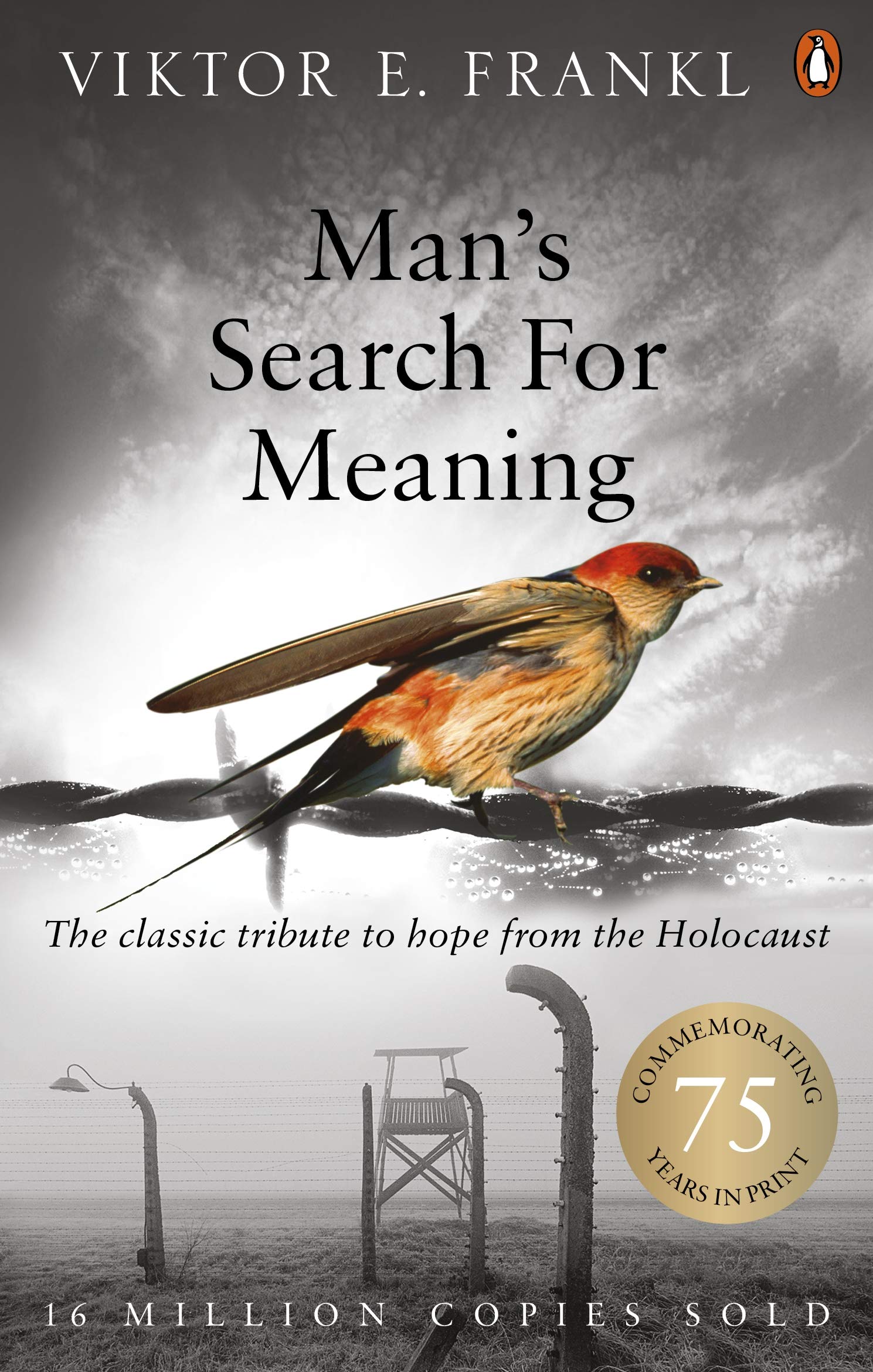Books for Reflection
St. Francis de Sales
An Introduction to the Devout Life
St. Francis de Sales is a Doctor of the Church and his writings are of particular relevance for lay people. He encourages us to be gentle with ourselves and with others.
Extracts
“Be calm regarding the changes of life. God, whose very own you are, will guide you through them all. He has kept you until now and he will lead you safely through all things. And when you cannot stand it, God will bury you in his arms. Be confident for tomorrow. The same everlasting Father who cares for you today will care for you then and every day. He will either shield you from suffering or give you unfailing strength to bear it.”
“There are an infinite number of minor temptations that a victory over them is fully as important as over the rarer but greater ones. These temptations are a perpetual trial to even the most devout, therefore we ought to prepare ourselves for this warfare. Be assured that every victory won over these little foes is a precious stone in the crown of glory which God prepares for us in Paradise.”
“Remember to seek the Consoler, not the consolations. Sometimes people imagine dry, distasteful services to God as being unacceptable to his divine majesty. On the contrary, our actions are like roses, which, though they may be more beautiful when fresh, have a sweeter and stronger scent when they are dried.”
“Receive the Blessed Sacrament often, so that you may learn to receive it better; because the more frequently one does something, the better he or she gets at it. Mountain hares turn white in winter because they live in, and feed upon, the snow; therefore, by feeding upon this Divine Sacrament of beauty and goodness and purity, you too will become lovely, holy and pure.”
“One very important direction in which to exercise gentleness is with ourselves: maintain a quiet, steady, firm displeasure at our own faults. Many people fall into the error of being angry with themselves because they have been angry, thus keeping up a chronic state of irritation which adds to the evil of what is past and prepares the way for a fall at the first occasion. All this anger and irritation with oneself fosters pride. A judge gives sentence more effectively by speaking deliberately and calmly than if he is loud and angry. Similarly, a parent’s tender and affectionate remonstrance has far more weight with his child than anger and sternness. Therefore, if we judge our own heart gently, encouraging it to amendment, its repentance will be much deeper and longer lasting. When you have fallen, lift up yourself and your heart humbly in quietness before God, without marvelling that you fell. Heartily lament that you should have offended God and begin anew to cultivate the lacking grace, with a deep trust in his Mercy and a bold, brave heart.”
St. Augustine of Hippo
The Confessions of St. Augustine
This book is regarded by some as the greatest literary work of the Western world and is a valuable insight into the life and struggles of a man searching for God.
Extracts
“You stir us so that praising you may bring us joy, because you have made us and drawn us to yourself, and our heart is restless until it rests in you.”
“This is the happy life, and this alone: to rejoice in you, about you and because of you. This is the life of happiness and it is not to be found anywhere else. Whoever thinks there can be some other joy is chasing a joy that is not the true one; yet such a person’s will has not turned away from all notion of joy.”
“When I was making up my mind to serve the Lord my God at last, as I had long since proposed, I was the one who wanted to follow that course, and I was the one who wanted not to. I was the only one involved. I neither wanted it wholeheartedly nor turned from it wholeheartedly. I was at odds with myself, and fragmenting myself. This disintegration was occurring without my consent, but what it indicated was not the presence in me of a mind belonging to some alien nature but the punishment undergone by my own. In this sense, and in this sense only, it was not I who brought it about, but the sin that dwelt within me as a penalty for that other sin committed with greater freedom; for I was a son of Adam.”
Commentary: “belonging to some alien nature but the punishment undergone by my own: No longer able to blame his vices conveniently on some separated other self, St Augustine comes to see how the alienation experienced in sin is the punishment of one’s own turning from the Good. Whereas divine conversion brings unity and integrity within the self, running from God brings disintegration and thus painful isolation not only from God but from others and, most ironically, from one’s own self as well. It is useful to see how, to St. Augustine’s Latin mind, the word for “devil”, diabolus, literally means “the one who divides and scatters” (dia “to disperse”, and ballo “to throw”, from which we get English words like “ball” and “ballistics”).
Bishop Robert Barron
Vibrant Paradoxes
This book brings together many themes that many would consider mutually exclusive. Seen through the Incarnation, these opposites come together and reflect new light in every direction, powerfully and elegantly explaining the Catholic faith. From Einstein to Lough Derg, it explores a wide range of topics in an upbeat, energizing style.
Fr Michael Paul Gallagher
Free to Believe: Ten Steps to Faith
This book faces the questions of twentieth-century society: what are the great roads by which we search for meaning within our lives? How can we avoid the imprisonment of the self today? How can we encounter the God of Love?
Extracts
“Over the years I have listened to a lot of students, and that listening has taught me reverence for the many struggles that go on within young people. If I were to sum up what were the most frequent areas of searching, I would have not difficulty in singling out two in particular: problems of self-worth and problems of images of God. The issues seem connected and to arise in that order.”
God invites us all to focus on our deepest desires on loving and serving Him and bringing others to do the same. Yet the modern world offers us many things which satisfy little needs, such as television and shopping, whilst our deeper needs go unmet. As D.H. Lawrence said, “We have little needs and deeper needs. We have fallen into the mistake of living from our little need till we have almost lost our deeper needs.”
Thomas Merton
The Seven Storey Mountain
This book has been described as one “which may well prove to be of permanent history in the history of religious experience.”
Extracts
“If what most people take for granted were really true-if all you needed to be happy was to grab everything and investigate every experience and then talk about it, I would have been a very happy person, a spiritual millionaire, from the cradle even until now. If happiness were merely a matter of natural gifts, I would never have entered religious life when I came to the age of a man.”
“The picture I have of my younger brother John Paul reminds me of my hard-heartedness and his natural humility and love. One day my friends and I had built a hut in the woods and were determined not to let him in, throwing stones at him to keep him out. I remember him just standing there, offended and tremendously sad.
Many times it was like that. And in a sense, this terrible situation is the pattern and prototype of all sin: the deliberate and formal will to reject disinterested love for the purely arbitrary reason that we do not want it. We will separate ourselves from that love. We reject it entirely and absolutely, and we will not acknowledge it, simple because it does not please us to be loved. Perhaps the inner motive is that the fact of being loved disinterestedly reminds us that we all need love from others and depend on the charity of others to carry on our own lives. And we refuse love and reject society, in so far as it seems, in our own perverse imagination, to imply some obscure kind of humiliation.”
Thomas reflects on going out, ‘to sit in a noisy place surrounded by many people’:
“Three or four nights a week my fraternity brothers and I went out in New York city. In dark rooms, we sat, shoulder to shoulder with strangers and their girls, while the whole place rocked and surged with storms of jazz. There was no room to dance. If you moved your arm to get a drink you nearly knocked the next man off his seat.
It was not that we got drunk. It was a strange, animal travesty of mysticism, sitting in those booming rooms with noise pouring through you and the rhythm throbbing in the marrow of your bones. If we got hangovers, it was more because of the smoking and nervous exhaustion than anything else.
Heading homewards, there is nothing so dismal as Flushing bus station, in the grey, silent hour just before the coming of dawn. The most depressing thing was the shame and despair that invaded my whole nature when the sun came up, and all the laborers were going to work. Men awake, healthy and quiet, with their eyes clear and some rational purpose before them. The sense of my own fruitlessness and misery was the nearest I could get to contrition. It was the reaction of nature. It proved nothing except that I was still, at least, morally alive: or rather that I had still some faint capacity for moral life in me. The term ‘morally alive’ might obscure the fact that I was spiritually dead. I had been that long since!”
Thomas on the school chaplain:
“His greatest sermon was on the thirteenth chapter of First Corinthians-and what a wonderful chapter indeed. He simply interpreted the word ‘charity’ in this passage (and in the whole Bible) was that it stood for ‘what we call a good chap, a gentleman.’ In order words, charity meant good sportsmanship, cricket, the right kind of clothes, using the right kind of spoon. There he stood in the plain pulpit and said, “If I talk with the tongues of men and of angels, and be not a gentleman, I become a tinkling cymbal… A gentleman is patient, is kind… A gentleman never falls away.” And so it went. I will not accuse him of finishing the chapter with “Now there remain faith, hope and gentlemanliness, and the greatest of these is gentlemanliness…” although it was the logical term of his reasoning.
The boys listened to these thoughts. But I think St. Peter and the twelve apostles, most of them martyrs for what they believed, would have been slightly surprised at the concept that Christ had been scourged and beaten by soldiers, cursed and crowned with thorns and subjected to unutterable contempt and finally nailed to the Cross in order that we might all become gentlemen.”
Victor Frankl
Man’s Search For Meaning
Victor Frankl survived the Holocaust and wrote a book describing his experiences. It has proved to be a valuable insight into human life and has sold over 16 million copies globally.
“The way in which a person accepts his fate and all the suffering it entails, the way in which he takes up his cross, gives him ample opportunity, even in the most difficult of circumstances – to add a deeper meaning to life.”
Extracts
“Mental health is based on a certain degree of tension, the tension between what one has already achieved and what one still ought to accomplish. What man actually needs is not a tensionless state but rather the striving and struggling for a worthwhile goal, a freely chosen task. What he needs is not the discharge of tension at any cost but the call of a potential meaning waiting to be fulfilled by him.”
“The more one forgets himself – by giving himself to a cause to serve or another person to love – the more human he is and the more he actualises himself.”
“Do not search for happiness. Search for meaning and happiness will follow.”
Other Recommended Books
The Priest is Not his Own, Archbishop Fulton J. Sheen
Letters to a Young Catholic, George Weigel
Call to Holiness on Love, Vocation and Formation, Emeritus Pope Benedict XVI, Ed Pietro Rossotti
Priests for the Third Millennium, Archbishop Timothy Dolan
Reclaiming our Priestly Character, Fr David Toups
Christ, The Ideal of the Priest, Dom Columba Marmion
The Joy of Priesthood, Msgr. Steve Rosetti
The Priest’s Way to God, Fr M. Eugene Boylan, OCSD
The Meaning of Vocation in the Words of St John Paul II, Scepter Publishing
The Cure D’Ars: St John-Marie-Baptiste Vianney, F. Trochu
He Leadeth Me, Walter Ciszek SJ
To Save a Thousand Souls: A Guide to Discerning a Vocation to Diocesan Priesthood, Brett A Brannen






